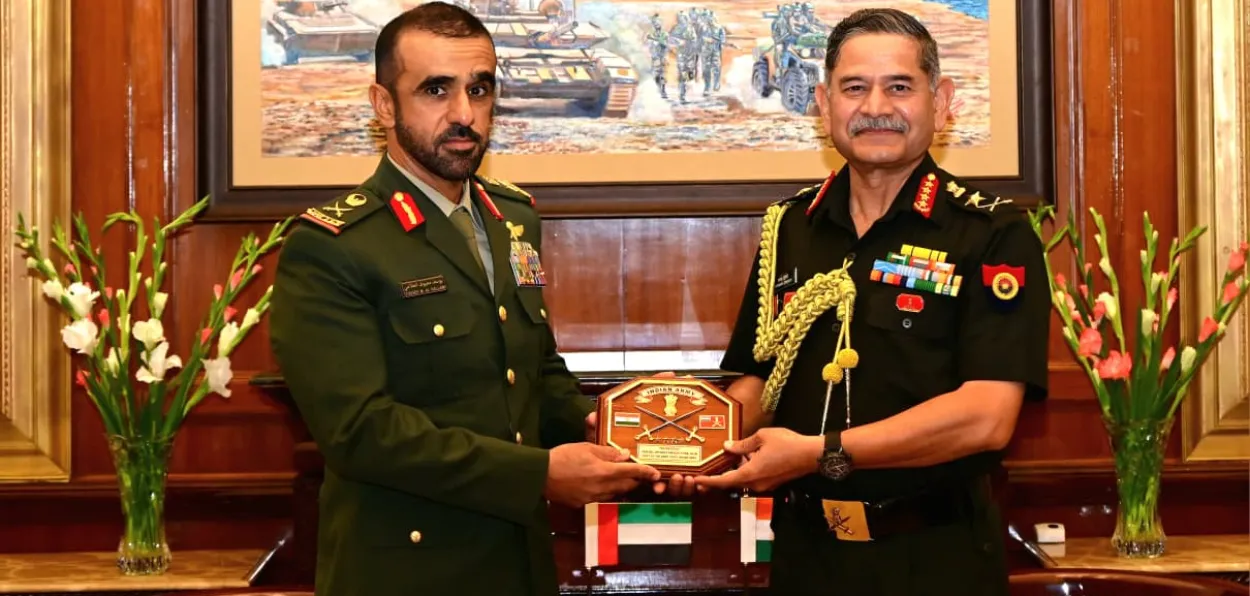
 Shankar Kumar
Shankar Kumar
Trade, energy and Diaspora have been important pillars of cooperation between India and the Gulf countries, yet what is today catching global attention is New Delhi’s quiet and consistent effort to establish itself as a reliable defence partner to these countries.
In the first week of October, India and Bahrain reaffirmed their commitment to strengthening defence and security cooperation. It’s pivotal move in their bilateral relations at a time when, in the wake of the Israel-Hamas conflict, the Middle East is undergoing major strategic realignments and New Delhi emerging as a significant player.
“The two sides expressed optimism for enhancing future collaboration in the areas of defence and security,” India-Bahrain joint statement issued after the 5th High Joint Commission (HJC) meeting between External Affairs Minister Dr S Jaishankar and Minister of Foreign Affairs of Bahrain Dr Abdullatif bin Rashid Alzayani in New Delhi on November 3, said.
While this underscores the deep mutual understanding between India and Bahrain, both sides have lost no time in revitalising their defence relations, which have grown in the past decade. In July 2020, New Delhi appointed a Defence Attache at its embassy in Manama.
In September, the Indian Navy’s three ships -- INS Mormugao, INS Tarkash and INS Tabar -- made a port call at Manama. Between 2015 and 2025, seven Indian naval ships and one Indian Coast Guard ship have visited Bahrain, giving a significant fillip to cooperation and interoperability with the Royal Bahrain Naval Force (RBNF).
India as a strategic partner
Bahrain occupies a strategic position along major global shipping lanes. For India, which imports more than 50% of its oil and nearly 70% of its gas from the region, ensuring the safe and uninterrupted transport of crude oil, gas, and other goods through these waters remains a priority.
It’s for this reason that the Indian Navy regularly deploys ships in the Gulf of Aden and the Gulf of Oman. Last year, the Indian Navy deployed a dozen ships, with two advanced vessels in the Gulf of Aden and at the mouth of the Persian Gulf, following an increase in attacks in the Red Sea—all this to present itself as a reliable regional partner.
Moreover, in this context, Jaishankar’s remark that “we will not be considered a responsible country when bad things are happening in the surrounding country and we say ‘I have nothing to do with this,” merits attention. It reflects India’s commitment to shoulder responsibility for ensuring the safety of commercial shipping and freedom of navigation through strategically vital waterways.
Deepening defence ties with the UAE
India’s partnership with the UAE is an example of how Delhi has removed roadblocks in this cooperation. At the 13th India-UAE Joint Defence Cooperation Committee (JDCC) meeting held in July 2025, both sides agreed to elevate defence ties to match the growing momentum in areas such as trade, investment, and people-to-people relations.
The two countries that held the first edition of the joint military exercise ‘DESERT CYCLONE’ at Mahajan in Rajasthan in January last year, have also robust engagement at the air force and the naval level. In April, the Indian Air Force joined the UAE Air Force and 10 other countries’ Air Forces, including those from the US, for the multinational air combat exercise ‘DESERT FLAG.’ Since March 2018, the two countries have been regularly holding bilateral naval exercise ‘GULF STAR.’
Both countries are exploring avenues to take their defence partnership to a new level. This includes joint production in the next generation of defence technologies, such as Artificial Intelligence, shipbuilding, including refits and upgrades, and maintenance of common platforms.
Rise in defence engagement with Saudi Arabia.
With Saudi Arabia, after energy, if any other sector that has gained prominence in India-Saudi Arabia relations is defence and security. In January-February 2024, armies of the two countries carried out their first joint military exercise, ‘SADA TANSEEQ’, at Mahajan in Rajasthan.
The first India-Saudi Arabia joint naval exercise—Al-Mohed Al-Hindi---was held in August 2021, and the second in 2023. The first round of Navy-to-Navy staff talks was held earlier this year.
Reflecting the deepening defence partnership between the two countries, New Delhi and Riyadh held the 7th Joint Committee on Defence Cooperation (JCDC) meeting on August 28, 2025, where their discussions focused on training, industrial partnerships, maritime cooperation, and military exercises. They also discussed cooperation in Cyber, IT, disaster management, and tactical communication.
However, beyond strategy and joint drills, the two countries also struck a defence deal when state-run Munitions Indian Limited (MIL) agreed to supply $225 million worth of artillery ammunition to Saudi Arabia in February 2024. As per Hindustan Times reports, this was followed by another deal worth $80 million for artillery ammunition last year.
Enhancing defence relations with Oman
Regarded as India’s closest defence partner in the Gulf region, Oman is the only country with which all three Indian armed service wings—Army, Navy, and Air Force conduct regular bilateral exercises.
However, moving beyond joint exercises and training, the India-Oman partnership has moved towards institutionalisation of defence cooperation. Joint committees, regular staff talks, memoranda of understanding, and shared planning documents provide a strong framework that ensures continuity, clarity, and steady momentum in bilateral engagement.
Last month, the two countries held the third Army-to-Army Staff Talks in New Delhi, where their discussion focused on enhancing bilateral cooperation through expanded joint exercises, expert exchanges in niche domains and deepening training collaboration.
Overall, it is through the Joint Military Cooperation Committee (JMCC), the highest forum for defence engagement between India and Oman, that the two countries assess and advise the general framework of their defence exchanges. The 12th meeting of the JMCC was held in Oman in 2024, where the two countries agreed to enhance cooperation in the field of joint exercise, information sharing, oceanography, ship building, maintenance, repair, and overhaul.
Firming up defence cooperation with Kuwait
Elevating their bilateral ties to a strategic partnership in 2024, India and Kuwait are keen to make their defence relationship robust. Last year, the two countries signed an MoU on defence cooperation, paving the way for joint military exercises, maritime security, coastal defence, and co-production of defence equipment.
For India, however, stronger defence partnership with Kuwait presents a broader Gulf strategy; while it helps in safeguarding its energy interests, it also helps in projecting its influence in the region.
Injecting momentum in defence ties with Qatar
In the past two decades, India has made a concerted effort to enhance and deepen its defence engagement with Qatar. Following the signing of the Defence Cooperation Agreement between the two countries in 2008, a foundational framework for security dialogue and training exchanges was laid. But the inaugural bilateral maritime exercise between the two countries was held in November 2019.
Both countries have used institutional frameworks such as the Joint Committee on Defence Cooperation to advance their military engagement. They regularly provide training opportunities in their defence institutions to military officials from each other’s armed forces, thereby enhancing professional exchanges and operational familiarity.
ALSO READ: Business leader Sirajuddin Qureshi changed mindset on women's education
India’s growing defence engagement across the Gulf countries marks a significant evolution of its foreign policy and national security setup. Yet what is noteworthy is its intent to become a reliable partner--all this, by steadily strengthening institutional frameworks, diversifying military cooperation, and establishing regular mechanisms for dialogue, training, and joint exercises.
